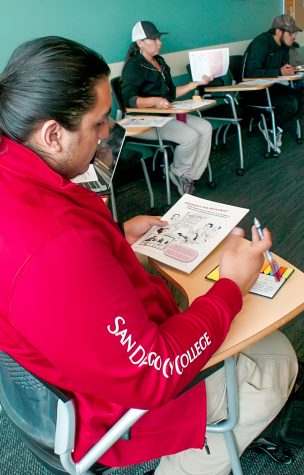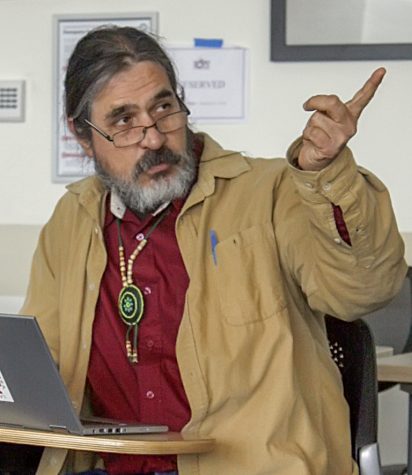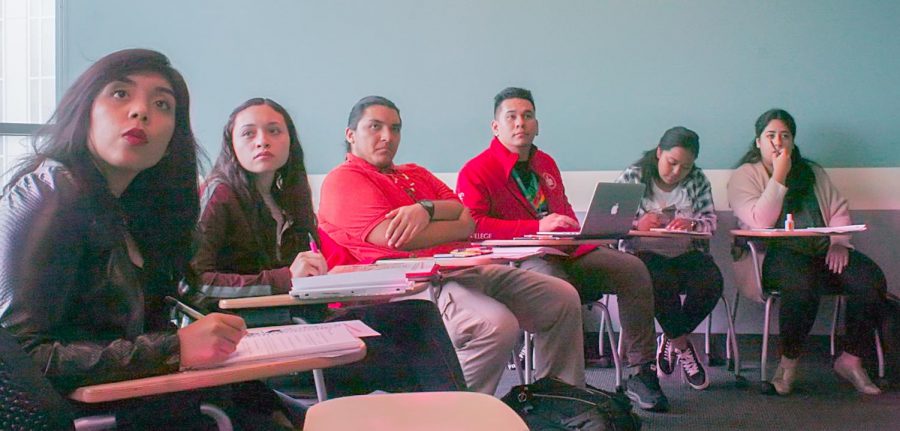City College student denied DACA
The American Federation of Teachers (AFT) Community to Support Immigrant Students pays close attention to a presentation on their rights, Nov. 8.
November 14, 2017
A 20-year-old Latinx student from San Diego City College was denied the Deferral Act of Childhood Arrivals permit (DACA) two weeks ago and now fears for her family’s safety.
The student, who asked not to be identified, is a Political Science major and said her younger sibling and cousins look at her as a role model because she’s the first of her family to graduate high school and the first one to attend college.
According to a report from the U.S. Citizenship and Immigration Services (USCIS) a total of 36,478 initial applications were received during 2017’s fiscal year and 31 of them were rejected. Many applicants for DACA like the student are Latinx, which is the gender neutral term for Latino.
The student came to America from Tijuana, Mex. when she was 10 years old to live with her aunt. During the first months after her arrival, her aunt was afraid others would find out her niece’s undocumented status, so she avoided taking her out to public places including clinics and hospitals.
Once the student was registered in school, however, her aunt had to change her mind. The school requested the student’s vaccination card so she had to go to the hospital for vaccinations.
About three years ago, the student thought it was time to get a DACA permit. She and her aunt, talked with six to eight lawyers in 2013, 2015 and 2016, but none of them took the case. “They said I didn’t qualify because I didn’t have much evidence,” the student said.
After all those consultations, “I was hopeless,” she said.

First Year Services Peer Advocate Antonio Torres Moreno reads a pamphlet on immigrant rights, Nov. 8.
In March, the student’s mother heard about a tax preparer and lawyer that processed DACA applications. She decided to try again. According to the student, the lawyer told her she qualified for the two-year permit.
The student was unsure, but filled out the DACA application, providing all the documentation she had on hand. She paid $499 for the application fee and $300 for lawyer that advised her.
The student received the letter two weeks ago; she said she had to read it several times before understanding the USCIS denied her application.
“They said it wasn’t enough, I don’t know how much proof they needed,” she said.
“I was mostly frustrated because I knew I wasn’t qualified,” the student said. Other lawyers had told the student she was unlikely to get DACA. “I didn’t want this to happen because now they have all my information from me and also my parents.”
The student failed to provide enough documentation from June to August from 2007, the year she arrived. She looked for information and got her grandparents’ tax information where she was included as a dependent.
According to the time frames guidelines from USCIS, one of the requirements to apply for DACA was to “have resided continuously in the U.S. since June 15, 2007.
Some of the documents requested to prove the applicant was in America since June 15, 2007 were receipts such as rent, tax, or utility bills; school records, passport entries, copies of money order among others.
The student said she was in the U.S. before that date but didn’t have enough documents prove it. Despite knowing her chance to get the two-year-permit was slim, she still had some hope.
Her parents are from a rural town from Oaxaca and they only studied up to sixth or eighth grade. Today, the student lives in San Diego with her immediate family and some of them are also undocumented. She said they all feel uncertainty about their future.
Chicano Studies professor Enrique Davalos, who is also part of AFT San Diego Community to Support Immigrants Students, knew about the student’s woes through a City College’s club.

Chicano Studies professor Enrique Davalos shares his insight during the meeting of the AFT San Diego Community to Support Immigrant Students, Nov. 8.
AFT San Diego Community to Support Immigrant Students is a group of students, professors and college staff from the San Diego Community College District and Grossmont Community College District that are creating a college network and resources to help immigrant students.
“If it hadn’t been for that club I wouldn’t have known about it. She would be alone confronting this situation,” Davalos said. He said this student’s case is not uncommon, adding many immigrants fall prey to unscrupulous lawyers who take advantage of their clients.
Davalos referred the student to San Diego Rapid Response Network and provided the organization’s number. She was then referred to a local lawyer.
The Rapid Response Network SD is a regional system that helps undocumented citizens when there are raids, arrests and abuse against the immigrant community. The organization is a collective of different organizations that are pro immigrants rights and community service. Members are activists, lawyers and community leaders, among other things.
Benjamin Prado, a member from US-Mexico Border program, American Friends Service Committee said USCIS is not going to share DACA recipients’ sensitive information, such as name or address, with US Immigration and Customs Enforcement (ICE).
“We also have to prepare ourselves for the worst case scenario,” Prado said and “get ready in case they (USCIS) change their mind.” He also said the community should have a course of action. “Get informed about our rights, organize, and a response plan to any threats.”
The student is interested in social justice, despite friends telling her it’s risky to attend marches and protests due to her undocumented status.










